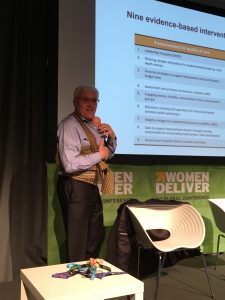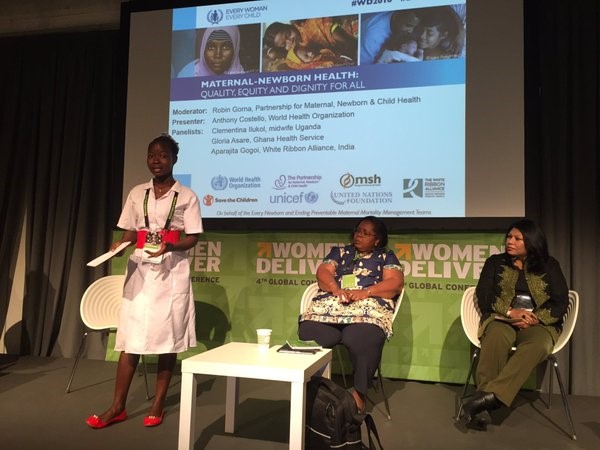Blog by: Amy Boldosser-Boesch, FCI Program of MSH; Olive Cocoman, WHO; Mary Kinney, Save the Children; Betsy McCallon, White Ribbon Alliance; Kadi Toure, PMNCH.
A powerful new integrated maternal-newborn health advocacy campaign focused on quality, equity and dignity of care for all mothers and babies was launched at the Women Deliver conference. The Global Strategy for Women’s, Children’s and Adolescents’ Health (Global Strategy) calls for ending all preventable maternal and newborn mortality and stillbirths. Greater quality of care is needed to preserve and protect the health of both mothers and babies, especially for those hardest to reach and where crisis prevails.
This advocacy campaign supports the technical efforts by UN agencies to lay the groundwork for a strong country-focused drive for quality maternal and newborn care. The World Health Organization (WHO) has developed a set of quality of care standards for maternal and newborn health and is preparing a roadmap for implementation and scale up. Successful implementation of this roadmap requires an intentionally linked advocacy movement to support country implementation, influence supportive global and national policies and investments, and to unify all stakeholders in joint action through a strong communications campaign. This new maternal-newborn health advocacy effort emphasizes the human rights-based goals of equity, universal coverage, access to quality care services, and dignity and respect for all women and babies. The effort takes forward the implementation of the Every Newborn Action Plan (ENAP) and Strategies towards Ending Preventable Maternal Mortality (EPMM) to achieve the goals of Global Strategy.

The launch took place during a side event on Tuesday, May 17, 2016. The event shared information about the new quality of care framework for maternal and newborn health led by WHO as well as to learned from different country experiences of successful improvements for quality, equity, and dignity for mothers and babies. Some highlights from the session:
- Anthony Costello, Director Maternal, Child and Adolescent Health, WHO, proposed that a related advocacy campaign on quality, equity and dignity for all mothers and babies, linked to WHO vision of the Quality of Care Framework, would improve measurable commitment by all stakeholders and drive greater access to care among those who need it most. He called for ‘Half in Five’ – a target of cutting facility deaths of mothers and newborns in half in the next five years by improving quality of services.
- Clementina Elukil, a young midwife providing care in a community clinic in rural Uganda, spoke passionately about the realities facing health workers with constrained resources. Using herself as an example, she delivers 30 babies per month, works 7am to 10pm and through the night if needed and may up for up to six kilometres just to get water to clean her delivery area. She needs more support from the health system.
- Gloria Quansah Asare, Deputy Director-General of the Ghana Health Services, underscored the importance of focusing on the full continuum of care and ensuring that advocacy is part of the Health Sector strategy.
- Anisa Omar, Program Manager, Adolescent Health in the Neonatal, Child and Adolescent Health Unit, Kenya Ministry of Health, stressed that reproductive, maternal, newborn , child and adolescent health is a health system issue requiring improved access to commodities, health worker capacity and retention, as well as strong leadership, management and governance skills.
- Aparajita Gogoi, the National Coordinator for White Ribbon Alliance, India and Executive Director of Center for Catalyzing Change, highlighted the inherent connection of quality and respectful care, which is brought together in the Respectful Maternity Care charter in India. She shared findings from the pilot study of the Mobile Monitor for Quality of Maternal Care model.
The session was organized by the World Health Organization (WHO), the Partnership for Maternal, Newborn and Child Health (PMNCH), the FCI Program of Management Sciences for Health, Save the Children, White Ribbon Alliance on behalf of Every Newborn and Ending Preventable Maternal Mortality management teams.
Read more>>>
